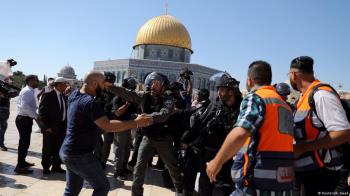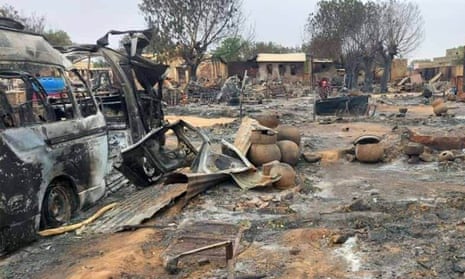Alwaght- Sudan is experiencing one of the biggest genocides. The UN has confirmed that about 460 patients have been killed in a horrible massacre in a hospital in the western city of Al-Fashir. These casualties are part of 2,000 people the Sudanese officials said were killed by the Rapid Support Forces (RSF) in less than a week.
The Sudanese military has confirmed its withdrawal from the city of El Fasher, following an 18-month siege. The fall of its last stronghold in the Darfur region effectively cedes control of the entire territory to the RSF rebels.
In a brutal takeover, the RSF fighters stormed the city's main hospital, slaughtering everyone they found inside and summarily executing patients, according to the Sudanese Doctors' Network.
Who is committing a genocide?
The RSF, the rebel group carrying out a massacre in Al-Fashir, are widely reported to have backing from the UAE.
Senator Chris Murphy, a Democrat from Connecticut, directly lashed put at his own country's support to the UAE, stating: "Evidence shows the UAE-backed RSF is committing a massacre in Al-Fashir, Darfur. So why does the United States allow the UAE—a country we militarily supply—to aid the brutal RSF?"
The fall of Al-Fashir, a city of nearly 300,000 people and the army's last stronghold in Darfur, has been catastrophic. Since October 26, 2023, the RSF has executed over 2,500 civilians, including an estimated 460 people in the Saudi Maternity Hospital alone.
This is not the RSF's first genocide in Darfur. The group's origins lie in the Janjaweed militias, which, with the support of the then-Sudanese government under Omar al-Bashir, systematically killed some 100,000 civilians between 2000 and 2003. The international community, including the US, in 2004 labeled those atrocities a genocide and identified Janjaweed commanders as war criminals and called for their disarming.
Mohammad Hamdan Daagalo, better known for his nom de guerre Hemedti, as a former general of the Sudanese army from Zargat tribe of Darfur was one of the commanders of the Janjaweeds who over the past three years has been the commander of the RSF against the Sudanese government, making Darfur once again a scene for massacre.
Scenarios ahead of Sudan
Following the fall of El Fasher, experts and observers suggest Sudan now confronts three potential scenarios: a military escalation, a push for political agreements, or a shift in international and regional approaches to the crisis.
The Sudanese government is escalating its rhetoric, demanding global action. Information Minister Khalid Al-Ayser called on the international community to designate the RSF as a terrorist organization. He demanded accountability for the rebels' leaders for their crimes in Al-Fashir, labeling them "criminal murderers with no connection to humanity."
In a contrasting response, RSF commander Hemedti expressed regret for the events in Al-Fashir and announced the formation of an investigative committee. He claimed the war was "imposed on the RSF," but declared that "the page of war in Al-Fashir has now been turned." He emphasized the need for residents to return to their homes so the city can restore a sense of normalcy.
Who is to blame?
There are two analyst views on the current escalation in Sudan.
Fathi Abu Ammar, a university professor, stated in an interview with Al Jazeera that responsibility for this bloodshed lies with those who created the causes for these successive wars in Sudan. Emphasizing the criminalization of the unlawful killing of any Sudanese citizen, he called for viewing the situation in Sudan as an interconnected whole, rather than in isolated parts.
Speaking on Al Jazeera Beyond the News, Abu Ammar pointed out that the Sudanese army has committed similar violations in several regions of Sudan. He argued that classifying the RSF as a terrorist entity does not solve the problem but rather complicates it further. This political expert believes that the actions of the RSF militias in the flash point city were a response to the measures and suppression carried out by the Sudanese army.
Meanwhile, Al-Moatasem al-Hassan, an advisor at the Higher Academy for Security and Strategic Studies in Egypt, believes that countries and international institutions are responsible for the massacres that occurred in Al-Fashir. He claimed that international institutions were merely spectators to the developments in Sudan and "intended to hand over Al-Fashir to the Rapid Support Forces rebels on a silver platter."
He accused NATO and its bases in Libya of disrupting the Sudanese armed forces and sending drones and aircraft to the RSF rebels to target the Sudanese army. According to al-Hassan, the Sudanese army has conducted a tactical retreat to a safe location, and military operations continue both around the city and through aerial campaigns.
Hailing the Sudanese army, the expert said that it resisted the RSF's push over the past two years and fought over 280 battles, but "intervention of foreign elements shifted the equation." He blamed the US and Britain for the current crisis, saying that they only pursued Sudan's talks but did nothing to stop destruction of Al-Fashir.
He described the atrocities in Al-Fashir as akin to the genocides in Rwanda or Srebrenica, stating that "lakes of blood" in the city are visible from satellites. He emphasized that these violations are not new, having continued for two years, and that the perpetrators are leaders who are well-known to the West.
Al-Hassan insisted that any future agreement for Sudan must be based on the terms of the Sudanese army and its people. He made it clear that there can be no place for the RSF in the country's future political or military life, and that the regional and international parties who fueled the flames of war must now exit the Sudanese stage.
The expert believes that the Sudanese army at the end of the road will regain control of the situation as at least 120,000 Sudanese volunteers have taken arms to deploy to Al-Fashir to fight the rebels and "the Rapid Support Forces have no future in Sudan, though they are supported by regional countries or neighbors."



























